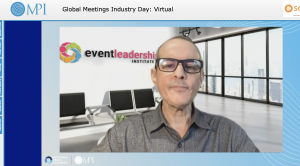Meeting Mentor Magazine
3 New Roles Meeting Planner Hirers Are Looking for Now

Howard Givner, Founder of the Event Leadership Institute, outlined some of the new roles and responsibilities employers are seeking in today’s meeting planner applicants during MPI’s 2021 virtual GMID program.
As we start to see an end to the pandemic-induced ban on in-person events, it may sound a bit dramatic to say the meetings industry just barely averted an “extinction-level event” — but it did. And we’re all stronger for it. So said Howard Givner, founder of the Event Leadership Institute, during a virtual session at Meeting Professional International’s Global Meeting Industry Day (GMID) program on April 8.
Related: Yes, You Can Find a Job in Today’s Depressed Market
But it also means that, with a competitive employment market on the horizon, it’s more critical than ever to be able to differentiate yourself, he added. In addition to having an agile, flexible attitude, a willingness to be a lifelong learner, and an ability to adopt new technology platforms and tools, there are three roles that will be key for the meeting planner job market of the near future, he said. While they do tend to overlap and will differ from organization to organization, they generally fall into three buckets:
• The business leader, who typically manages an event team and the overall events portfolio, and understands how the events team plugs into the organization’s overall goals. They need to be able to work with stakeholders to identify and clarify the goals they expect the meeting to accomplish, as well as key metrics that will define the success of the event, and then determine what type of event to design to achieve those goals.
Business leaders also should be able to determine which events no longer serve the purpose they were created to serve, as well as determine what new events need to be created to serve those needs — and what form they should take. They also should be able to talk about budget, and customer valuation as a percentage of that budget, in the same way as their meeting stakeholders do, in order to determine a return on investment (ROI) that makes sense to the stakeholder and reflects the reality of the event, said Givner.
Related: How to Deliver Value to Digital Event Sponsors
• The omni-channel event designer manages the event team for a specific event. They understand how to achieve an event’s goals through all types of events, be they in-person or digital, a sales meeting or a podcast. “The idea is that you want to be able to reach your constituents in the manner that makes sense to deliver your message in way they are comfortable with and will be able to digest,” Givner said. This means developing attendee personas to better understand the audience’s needs, determining which content delivery models make the most sense for different personas.
• The technical event producer manages all aspects of digital events, including tech vendors and speakers. They need to be able to understand the different virtual event tech platforms and how they correspond to the capabilities you need for your event, he said. They need to be able to put together a run of show and execute it from start to finish, as well as coach speakers on how to best connect with remote audiences.
Related: What Online Event Attendees Really Want
He quoted Jeff Bezos as saying, “Your brand is what other people say about you when you are not in the room.” Yes, it’s important to do a self-assessment, but make sure that it lines up with what your boss or client is looking to you to provide. Are there gaps?
If so, he said, “Invest in yourself. Learn new skills. Make it a lifelong journey to develop yourself.”
Design by: Loewy Design